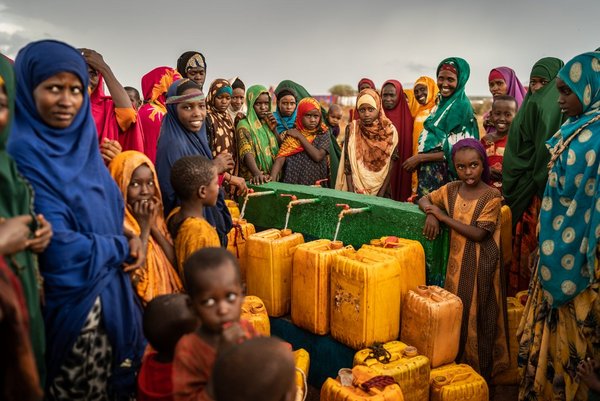 Read this article in French
Read this article in French- Share this article
- Subscribe to our newsletter
Droughts increase HIV risk for rural women
Climate change-driven droughts are causing a rise in the risk of HIV infection among rural women in Sub-Saharan Africa by driving them into sex work, according to a five-country study, SciDev.Net reported in March 2024.
Researchers from the University of Bristol in the UK linked HIV prevalence data from more than 100,000 adults surveyed in Lesotho, Eswatini, Zambia, Tanzania and Uganda between 2014 and 2016 with historical rainfall patterns. They observed that women living in drought-stricken rural areas had a higher likelihood of contracting HIV compared to people in unaffected regions or urban settings, regardless of gender.
The researchers say that droughts, which have become more frequent and intense as a result of climate change, exacerbate existing vulnerabilities, particularly in rural communities heavily reliant on subsistence farming. This translates to increased poverty and food insecurity, factors known to contribute to the spread of HIV, according to the study, published in the journal AIDS and Behavior and funded by Wellcome. It says drought-induced hardship is often disproportionately borne by women, who may engage in transactional sex, particularly with older, richer men, to secure basic necessities.
The study also notes that droughts can exacerbate mental health issues and heighten gender-based violence, both of which are linked to risky sexual behaviours and can hinder access to vital HIV prevention and treatment services.
With approximately 15 per cent of land in Sub-Saharan Africa currently experiencing drought, and a high HIV prevalence, the researchers say that their findings underscore the potential for a surge in HIV transmission if the issue is left unaddressed.
One in five adults on the continent have HIV and the majority of the population relies on subsistence farming, creating a perfect storm of factors, says Adam Trickey, research fellow at the University of Bristol. He adds that even minor climate shifts, combined with Africa’s HIV burden and drought exposure, could dramatically impact HIV transmission.
Mark Lieber, HIV clinical fellow at the Los Angeles Department of Health and Human Services/USA, notes that the study puts flesh on the bones of the assumed link between climate change and HIV. However, he stresses that drought is “only one of the many environmental consequences of increased carbon emissions world-wide”.
Lieber believes that impactful interventions need to come not only from reducing carbon emissions but also from developing resilience, through multidisciplinary collaborations. He told SciDev.Net: “Enhancing food security in the Global South and empowering women are perhaps two of the best things we can do to protect the most vulnerable from the negative health impacts of climate change.”
(Elna Schütz/SciDev.Net/ile)
Read more on the SciDev.Net website





Add a comment
Be the First to Comment